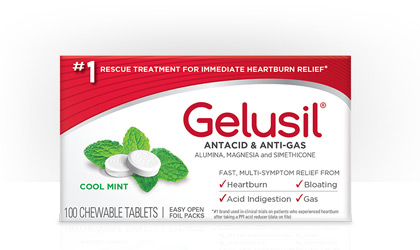- American College of Gastroenterology. Is it just a little heartburn or something more serious? http://s3.gi.org/patients/pdfs/UnderstandGERD.pdf. Accessed May 20, 2013.
- Mosby's Medical Dictionary. 8th ed. Maryland Heights, MO. Elsevier Health Sciences. 2009.
- Jacobson BC, Ferris TG, Shea TL, Mahlis EM, Lee TH, Wang TC. Who is using chronic acid suppression therapy and why? Am J Gastroenterol. 2003;98(1):51-58.
(Other sources of information used to write this section include:)
American College of Gastroenterology. Acid Reflux. http://patients.gi.org/topics/acid-reflux/. Accessed May 20, 2013.
Institute for Quality and Efficiency in Health Care. Fact sheet: Heartburn and GERD. http://www.ncbi.nlm.nih.gov/pubmedhealth/PMH0048152/. Published July 19, 2012. Updated September 13, 2012. Accessed May 20, 2013.
MedlinePlus. Heartburn. http://www.nlm.nih.gov/medlineplus/ency/article/003114.htm. Updated January 31, 2011. Accessed May 20, 2013.
American College of Gastroenterology. Is it just a little heartburn or something more serious? http://s3.gi.org/patients/pdfs/UnderstandGERD.pdf. Accessed May 20, 2013.
American College of Gastroenterology. Digestive Health Tips: 10 Tips on Belching, Bloating, and Flatulence. http://patients.gi.org/topics/digestive-health-tips/. Accessed May 20, 2013.
† Stop use and ask a doctor if symptoms last more than 2 weeks.
Nexium®, Prilosec OTC®, Prevacid®, Tums®, AcipHex®, Protonix®, Zegerid OTC®, Rolaids®, Maalox®, Pepcid® AC®, Tagamet®, and Zantac® registered trademarks are property of their respective owners.



